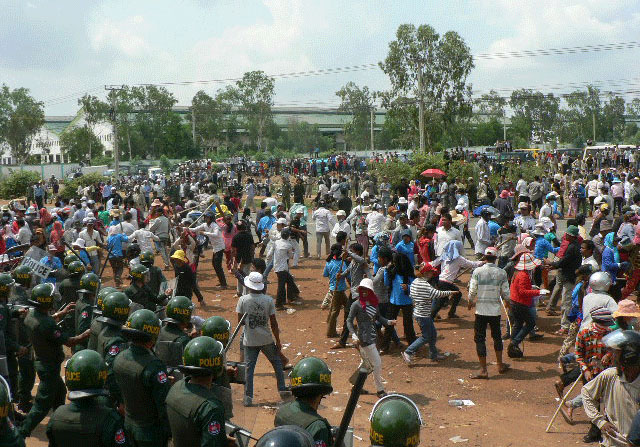
Feb 11, 2014 | News
The ICJ condemned the Cambodian Court of Appeal’s decision to deny bail to 21 workers and activists who were arrested in connection with protests by garment factory workers.
They have been held in detention since their arrests on 2 and 3 January 2014.
The court upheld an earlier decision of the Phnom Penh Municipal Court.
Garment factory workers were protesting to seek a higher minimum wage.
“International law is clear that pre-trial detention may only be ordered in exceptional circumstances and avoided if suitable alternatives are possible,” said Sam Zarifi, ICJ’s Regional Director for Asia and the Pacific. “The ongoing detention of these protesters, and the failure of the government to provide accountability for the death of five unarmed protesters on 3 January, demonstrates the government’s efforts to stop protesters exercising their rights to assemble freely and express their opinions.”
“Not only is this a very disappointing outcome for the 21 detainees and their families, but it also sets a worrying precedent in what is still a developing area of the law in Cambodia,” he added.
Article 9 of the International Covenant on Civil and Political Rights (ICCPR), to which Cambodia is a party, guarantees the right to liberty.
It states, “It shall not be the general rule that persons awaiting trial shall be detained in custody, but release may be subject to guarantees to appear for trial.” Such guarantees include bail.
Articles 19 and 21 of the ICCPR guarantee the rights to freedom of opinion and assembly.
Contact:
Sam Zarifi, ICJ Asia-Pacific Regional Director, (Bangkok), t:+66 807819002, e-mail: sam.zarifi(a)icj.org
Craig Knowles, ICJ Media & Communications, (Bangkok), t:+66 819077653, e-mail: craig.knowles(a)icj.org
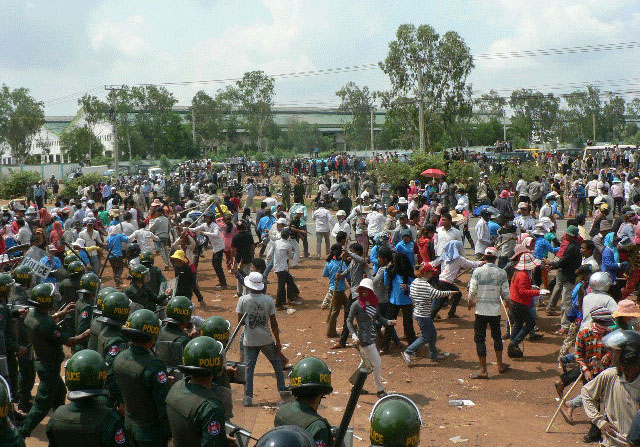
Jan 23, 2014 | News
The ICJ criticized the Phnom Penh Municipal Court’s decision to deny bail to 23 people who were arrested and detained earlier this month following protests by garment factory workers seeking a higher minimum wage.
The detainees’ lawyers told the ICJ that the court denied bail for the first nine detainees, arrested on 2 January 2014, in order to “guarantee their presence for further legal proceedings”, “to preserve public order” and “to prevent instability that results from the commission of crimes”.
The remaining 13 detainees, arrested on 3 January 2014, were denied bail in order to “end crime”, “prevent new crime” and “ensure detainees are available for trial”.
The decision to deny bail to the 22 detainees followed the Court’s decision on 13 January 2014 to deny bail to Vorn Pao, President of the Independent Democracy of Informal Economy Association (IDEA).
Considering his application separately from the others, the court, similarly, provided the same reasons as in the case of the first nine detainees.
“International law is clear that pre-trial detention could only be exercised in exceptional situations, and avoided if suitable alternatives are possible,” said Sam Zarifi, ICJ’s Regional Director for Asia and the Pacific. “The reasons presented by the Court don’t justify holding these activists in prison right now.”
All 23 of those whose bail applications have been denied have been charged with causing intentional violence and damage to property. Three face additional charges for violent resistance against a public official, as well as a traffic offence.
They were arrested as part of the government’s response to striking garment workers and demonstrators protesting the 28-year-rule of Prime Minister Hun Sen (photo).
Security forces shot and killed at least four protesters on 3 January. The government has banned further protests.
Article 9(3) of the International Covenant on Civil and Political Rights (ICCPR), to which Cambodia is a party, guarantees the right to liberty. It states, “It shall not be the general rule that persons awaiting trial shall be detained in custody, but release may be subject to guarantees to appear for trial”. Such guarantees include bail.
“There are alternatives to the detention, such as bail or other conditions the court could impose on these 23 detained activists if the Court is concerned, on the basis of substantiated and objective grounds that there is a risk that each of them will abscond before the trial or interfere with the investigation,” said Zarifi. “In the absence of such proof and the serious consideration of alternatives the continued pre-trial detention of each of the 23 individuals would amount to arbitrary detention under international human rights standards.”
Vorn Pao’s lawyers filed an appeal on 14 January 2014 and the Court is expected to issue a decision on his appeal by 3 February 2014.
According to the Cambodian Centre for Human Rights, Vorn Pao appears weak and continues to suffer pain from the head injuries he sustained.
Lawyers for the other 22 detainees have also expressed their intention to appeal the Court’s decision to deny them bail.
Contact:
Sam Zarifi, ICJ Asia-Pacific Regional Director, (Bangkok), t:+66 807819002, e-mail: sam.zarifi(a)icj.org
Craig Knowles, ICJ Media & Communications, (Bangkok), t:+66 819077653, e-mail: craig.knowles(a)icj.org
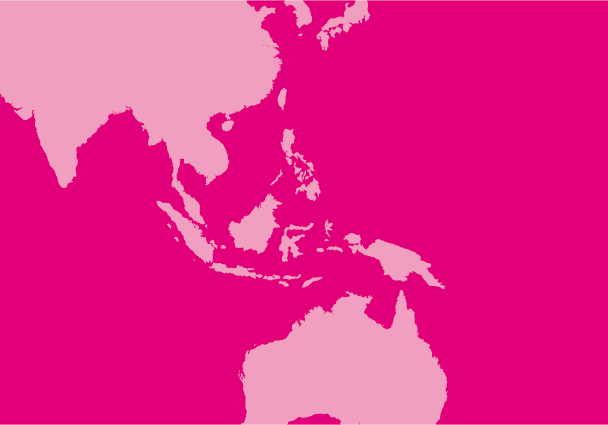
Apr 5, 2013 | News
The ICJ urged the Cambodian Bar Association to make it clear that its new Code of Ethics, launched today, does not restrict the freedom of lawyers to express their opinions.
Article 17 of the new Code of Ethics states (in an informal translation by the ICJ) that “All interventions made publicly or through public media by lawyers in their capacity as lawyers may be permitted only within the framework of strict compliance with the duties of the legal profession. Such interventions require diligence.”
This language replaces Article 15 of the 1995 Code, which demanded all lawyers in Cambodia to “inform” or “consult” the Bar President before making media statements.
“The language of the new Article 17 is an improvement over the old Code, but it is ambiguous and raises fears that lawyers will not be able to exercise their right to express their opinions freely,” said Emerlynne Gil, ICJ’s International Legal Advisor on Southeast Asia. “The Cambodian Bar Association must clarify that under Article 17, lawyers, like all others, can address important legal and policy issues publicly and openly.”
The ICJ asserted that the Bar Association must clearly and publicly state that Article 17 shall not be construed to mean that lawyers must seek permission prior to engaging in public activities in their professional capacity.
The ICJ also expressed concern over the previous statements made by the Bar Association implying that lawyers could be sanctioned for expressing certain views of the country’s laws or legal reforms. During a press conference on 15 March 2013, the Bar Association said that the purpose of Article 17 was to prevent lawyers from misinterpreting the law and thus “making society chaotic”.
“The best means of increasing public awareness of the laws and strengthening the rule of law is to encourage greater public discussion,” said Emerlynne Gil. “Disagreements about the meaning of laws are part of the nature of the legal process and should be encouraged publicly.”
The ICJ recognizes the grave difficulties of facing the legal system in Cambodia, where fewer than 1000 active lawyers must provide services for a population of more than 14 million people. “We share the Cambodian Bar Association’s concerns about the need to uphold the professional competence and integrity of its members,” said Emerlynne Gil. “However, this concern should be addressed through efforts to improve legal education expertise rather than limiting the right of lawyers to freedom of expression.”
For questions and clarifications, please contact Ms. Emerlynne Gil, International Legal Adviser for Southeast Asia, tel. no. +662 619 8477, fax no. +662 6198479 or emerlynne.gil@icj.org
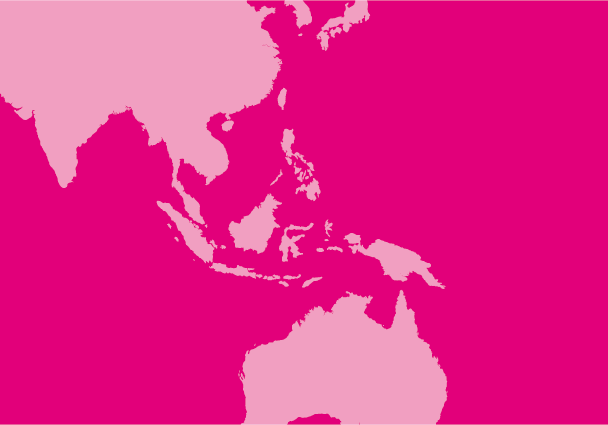
Oct 2, 2012 | News
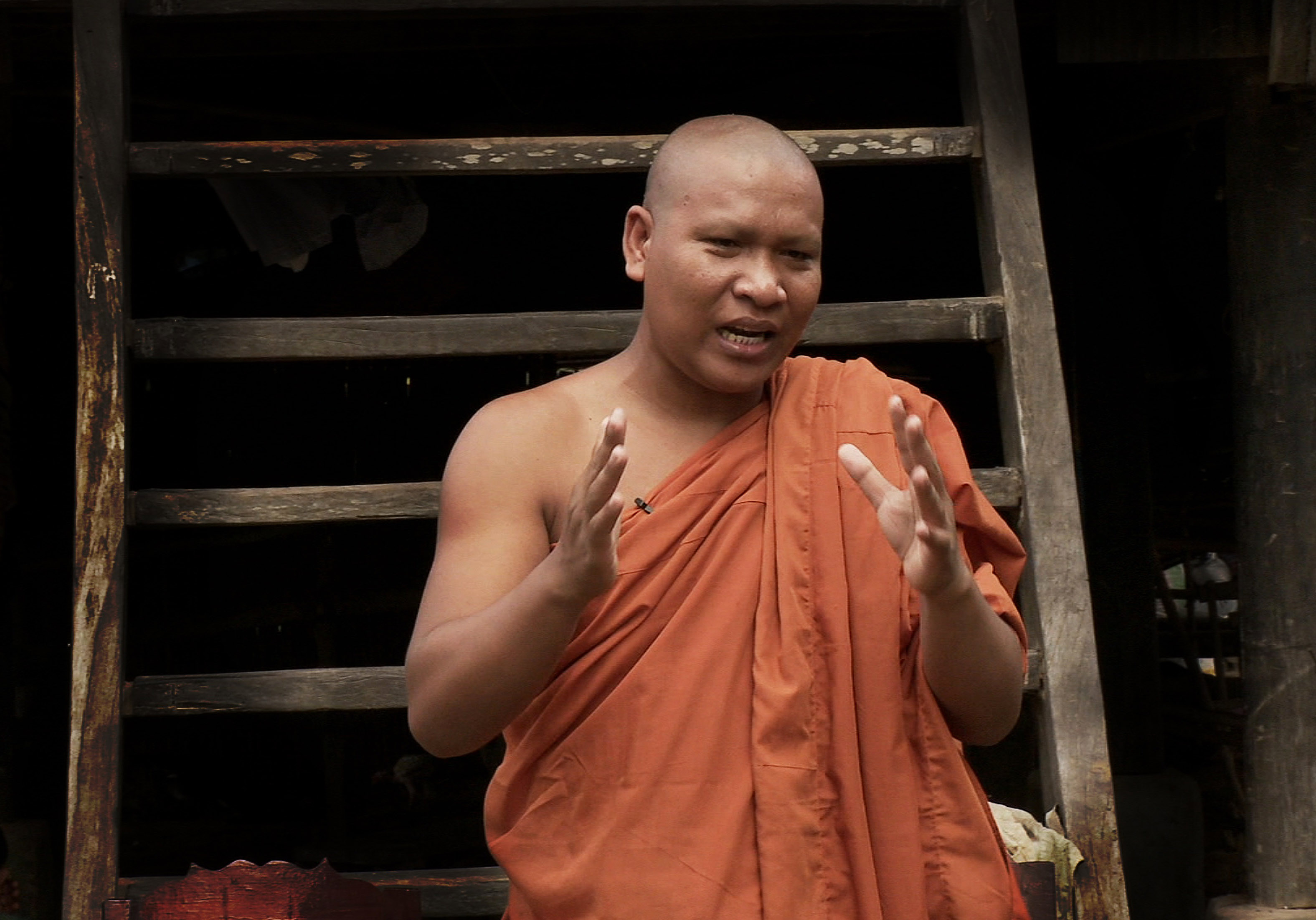 The Jury of the Martin Ennals Award for Human Rights Defenders (MEA) selected the Venerable Luon Sovath as the 2012 Martin Ennals Award winner. The Prize winner was announced at a ceremony in Geneva.
The Jury of the Martin Ennals Award for Human Rights Defenders (MEA) selected the Venerable Luon Sovath as the 2012 Martin Ennals Award winner. The Prize winner was announced at a ceremony in Geneva.
The Venerable Luon Sovath, a Buddhist monk from Siem Reap, Cambodia witnessed his family and fellow villagers being forcibly evicted from their homes in 2009. Since then he has been a strong advocate against forced evictions, which remove families from their homes, often violently and little or no compensation.
Despite threats to his person, of arrest and disrobing, the Venerable Sovath, a non-violent Buddhist monk, uses videos, poems and songs to defend the right to housing. His advocacy touches powerful economic interests. The threats against the Venerable Sovath are very real.
Venerable Sovath was selected from among three final Nominees (see video presentation at the end of this article). Also nominated was Nasrin Sotoudeh, an Iranian Lawyer serving a 6 year prison sentence in Iran for her Human Rights work. She is known particularly for her work on behalf of women and children’s rights, especially juveniles facing execution. The third nominee is the Bahrain Center for Human Rights, who report widely on human rights abuses in Bahrain. Many of their key staff are currently imprisoned for their work.
The New Chair of the Martin Ennals Foundation, Micheline Calmy-Rey, the former Swiss President and Foreign Minister said: “This year’s novel format with three nominees made the Jury’s decision particularly difficult. As a Buddhist monk, Venerable Sovath has managed to raise wider attention to the issue of forced evictions in Cambodia”
The Martin Ennals Award for Human Rights Defenders (MEA) is a unique collaboration among ten of the world’s leading human rights organizations to give protection to human rights defenders worldwide.
The Jury is composed of the following NGOs: Amnesty International, Human Rights Watch, Human Rights First, International Federation for Human Rights, World Organisation Against Torture, Front Line, International Commission of Jurists, German Diakonie, International Service for Human Rights and HURIDOCS.
Previous laureates : Kasha Jacqueline Nabagesera (2011) Muhannad Al-Hassani, Syria, Emad Baghi, Iran; Mutabar Tadjibaeva, Uzbekistan; Pierre Claver Mbonimpa, Burundi and Rajan Hoole-Kopalasingham Sritharan, Sri Lanka; Akbar Ganji, Iran and Arnold Tsunga, Zimbabwe; Aktham Naisse, Syria; Lida Yusupova, Russia; Alirio Uribe Muñoz, Colombia; Jacqueline Moudeina, Chad; Peace Brigades International; Immaculée Birhaheka, DR Congo; Natasha Kandic, Yugoslavia; Eyad El Sarraj, Palestine; Samuel Ruiz, Mexico; Clement Nwankwo, Nigeria; Asma Jahangir, Pakistan; Harry Wu, China.
Patrons of the Martin Ennals Award: Asma Jahangir, Barbara Hendricks, José Ramos-Horta, Adama Dieng, Leandro Despouy, Louise Arbour, Robert Fulghum, Irene Khan, Theo van Boven and Werner Lottje†.
Contact: Michael Khambatta, t: +41 79 474 8208; e-mail: khambatta(at)martinennalsaward.org or visit www.martinennalsaward.org
Video presentation of the three nominees: Luon Sovath (Cambodia), Nasrin Sotoudeh (Iran), Bahrain Center for Human Rights (Bahrain)
Dec 21, 2010
Article 1 – Scope For the purposes of the present Prakas the term “reporting entities” shall apply to the following institutions and professions, which are not regulated by the National Bank of Cambodia and are referred to as “reporting entities” in the Law on...









